What makes a teacher great? It’s a difficult question to answer, and it’s one that teacher evaluation criteria have been trying to nail down for years! However, we would argue that great teachers often look quite different from each other. Yes, great teachers inspire a love of learning and teach their subjects well; however, the very best teachers have that special something about them that ingrains them in our hearts.
In this blog, we’ll be discussing 9 notable teachers from television and movies. We’ll evaluate them based on several common criteria before we try and identify that special something that makes these teachers so great. We’ll also rank them based on who gets the best scores, so strap in and get ready to scrutinize some of the most beloved teachers in media.
#1. Mr. Feeney, Boy Meets World

Arguably one of the most recognizable teachers in media, Mr. Feeney is beloved by 80s and 90s kids alike. And for good reason! Boy Meets World spanned over seven years, and Mr. Feeney was a near-constant presence in the lives of the main characters, offering sage advice and personal guidance when it was most needed.
So, how would Mr. Feeney fare on a modern teacher evaluation? Let’s evaluate him based on these four criteria.
Student growth: 5/5
We, as viewers, have the benefit of seeing 7 years' worth of student growth data! Mr. Feeney’s students don’t just grow academically, but they grow in several other important life domains. They become wiser, kinder, and more considerate members of society.
Classroom management: 5/5
Mr. Feeney’s class is well under control, but there is still a sense of trust and a great back-and-forth between student and teacher. In the cases where his three most troublesome students do act out, he’s fast to act and redirect their attention.
Instructional practices: 5/5
While Mr. Feeney was limited technologically, he used a lot of tried and true best practices to keep a classroom engaged. One of his greatest skills lies in his ability to tie lessons to real-life problems with real implications. In one lesson, Mr. Feeney uses his discussion of the Gutenberg printing press to direct his class’s attention to their underappreciation and abuse of technology.
Assessment and feedback: 5/5
Throughout the series, it’s evident that Mr. Feeney’s tests are difficult. In one scene, Eric complains about the eleven answer choices per question. Interestingly enough, this isn’t a bad practice to gather nuanced student data that could help tackle misconceptions! Plus, he offers frequent, targeted feedback during lessons that help his students reconsider their mistakes.
#2. Miss Honey, Matilda

Matilda is one of those movies that heals little parts of the soul, and Miss Honey plays a big part in that. She not only sees and cultivates the gifts of the movie’s title character, but she is a gentle, comforting presence to all of her students, standing in direct opposition to the horrible Ms. Trunchbull.
While a very nurturing spirit, is Miss Honey as skilled as she is lovable?
Student growth: 5/5
With Miss Honey’s encouragement, Matilda is able to excel in school. She even advocates for Matilda to skip a grade once she realizes she has nothing left to teach her. When we see Miss Honey teaching the class as a whole, it’s clear that everyone, Matilda included, is learning and growing in important domains.
Classroom management: 5/5
Miss Honey’s classroom is well managed out of necessity. With only a word, her entire class works together to hide everything in the classroom that could alert Ms. Trunchbull to their secret, fun atmosphere. Her class is also very quiet and engaged, often responding back to questions and prompts. We will ignore the fact that her students attacked an administrator because this administrator put students in torture devices.
Instructional Practices: 5/5
Individualized teaching? Miss Honey has it down. She obviously has a great grasp on the needs of the individuals in her classroom, as she is able to teach and guide Matilda with specialized assignments and lessons that help her excel, all without missing a beat in her regular classroom.
Assessment and feedback: 5/5
While we only have a few examples of assessment and feedback, it seems that Miss Honey’s classroom is rife with opportunities for them. She’s built call and response into her lessons while still assigning homework and other activities that could help her more directly measure student progress.
#3. John Keating, Dead Poets Society
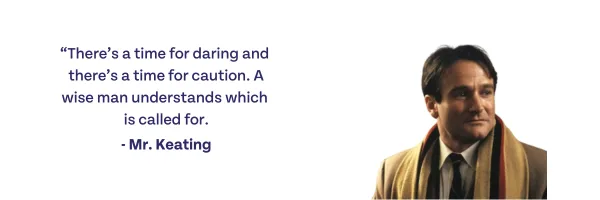
Mr. Keating’s character is beloved for many reasons. Robin Williams’ portrayal of this charismatic character made Keating and Dead Poet’s Society immortal. Keating embodied the heart and soul of education in that his greatest desire was to teach his students to think for themselves. If he could cultivate their thoughts and teach them to express themselves, then he’d have prepared them to live a life well lived.
Mr. Keating is an extraordinary teacher, but what would his scores indicate about his teaching?
Student growth: 5/5
Mr. Keating’s focus was on teaching his students to live life to the fullest, carpe diem. A significant portion of his students showed impressive growth in the domains that mattered most to him. Not only did the renewed Dead Poet’s Society members live a full life, but they also learned to think critically and challenge tradition. Not to mention, he inspired a love of poetry in a group of adolescent boys–an impressive feat, to be sure.
Classroom management: 3/5
Can you imagine letting an entire group of students stand on their desks or rip pages out of their textbooks? While very poetic and fun to watch in movie form, there’s no place in the real world for that kind of behavior. When Mr. Keating isn’t encouraging the destruction of school property, he has cultivated an incredible atmosphere of growth, acceptance, and creativity.
Instructional practices: 5/5
Mr. Keating is an engaging teacher with more than a few fun tricks up his sleeve. He takes his students out for walks around the campus, encourages them to stand up in front of the class and read their poetry, and teaches with such enthusiasm that he keeps an entire group of headstrong boys interested in the lesson! Every lesson is memorable, and that takes real skill.
Assessment and feedback: 5/5
One of the only instances of formal assessment and feedback in the movie is when he asks the students to stand up and read the poems they’ve written. He gently rebukes a student who refuses to participate and uses this as a teaching moment. Then, he draws the passion out of a reluctant student by having him perform an imaginative exercise in front of the class. The impact of this lesson is evident throughout the movie.
#4. Barbara Howard, Abbott Elementary
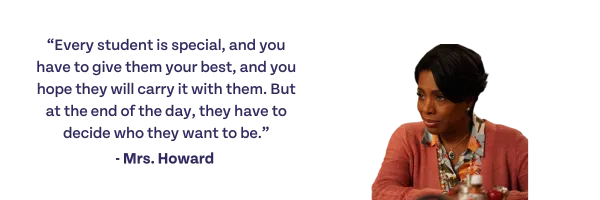
Mrs. Howard is a veteran teacher with an unshakable devotion to her profession. She continually proves to be the glue that holds Abbott Elementary together, solving problems for students and teachers alike. Though she’s gotten plenty jaded about the state of the education system and the ways in which authority figures have failed her students and her school, she can’t imagine being or doing anything else.
In fact, one of the most touching episodes of the show is one in which she contends with her impending retirement by mourning the retirement of the tuatara that has been present at the zoo throughout her teaching career. Barbara Howard isn’t just a dedicated, passionate teacher, she’s also a very skilled one. Let’s see how her evaluation shakes out.
Student growth: 5/5
Unfortunately, we don’t get many specific examples of Barbara’s students growing, as the focus tends to be on Janine’s classroom. However, we do know from conversations around the school that Barbara’s classroom has a high rate of success. We even see an example of a grown student who has become a highly successful entrepreneur! Forget the fact that he isn’t a great guy.
Classroom management: 5/5
Barbara shares many teaching gems with Janine, her mentee. Many of them center around classroom management, and it’s clear that Barbara speaks from experience. Her classroom is always quiet, engaged, and under control. Aside from the one time when students were jumping across desks, there is not much that happens in Mrs. Howard’s classroom that she doesn’t already know about.
Instructional practices: 4/5
Mrs. Howard has few weaknesses, but one of them is a stubbornness to try new techniques or incorporate new technology. The way that she teaches works! And she doesn’t like the shake that up. In one episode, she complained about and ridiculed the professional development she had to take, citing her decades of experience as reason enough to skip it.
Assessment and feedback: 4/5
We don’t see many instances of assessment and feedback inside Mrs. Howard’s classroom; however, she is often checking in on and offering corrections for her other pupils, mainly the less experienced teachers at Abbott. If her interactions with her fellow teachers are any evidence of her assessment practices in the classroom, then we can assume she is a pro.
#5. Jaime Escalante, Stand and Deliver

One of the greatest teachers on this list just happens to be based on a real teacher, Jaime Escalante, a southern Californian math teacher whose celebrated career spanned several decades. In the movie, Stand and Deliver, Mr. Escalante is a hard, sarcastic, dedicated teacher who was able to bring a class of 18 students through the AP exams with a perfect passing rate.
While Mr. Escalante is undoubtedly an incredible teacher, there is an asterisk or two on some of the practices he uses to engage and motivate his students. Here’s his evaluation.
Student growth: 5/5
Stand and Deliver is about 100 minutes of evidence of student growth! At the beginning of the movie, his students are disengaged, full of attitude, and struggling with basic math. At the end of the movie, his students are strong learners, respectful individuals, and excellent at Calculus!
Classroom management: 3/5
Mr. Escalante’s classroom management techniques work for him; let’s make that clear. In his Southern Californian school, he had to make some decisions that might not work for other schools. However, he often used shame, embarrassment, and threats to get his students to comply with his wishes. He even let students leave class unchallenged. For many of his students, this technique was exactly what they needed.
Instructional practices: 5/5
We see Mr. Escalante using several unique teaching techniques throughout the movie. While he lectured, he would use physical props, interesting questions, and stories to get the lesson to sink in. Sometimes, he used games and activities to help students practice difficult concepts. He had a huge repertoire of techniques up his sleeve, and there’s plenty of evidence that they were effective.
Assessment and feedback: 5/5
Mr. Escalante is an assessment and feedback professional. Not only does he constantly assess and respond to students in the classroom during lessons, but he also uses their scores, assignments, and practice tests to decide what kind of lessons they need next. He is constantly aware of their data and making informed decisions to help them learn!
#6. Markie Hillridge, English Teacher
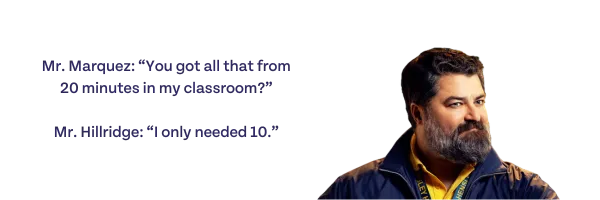
Coach Hillridge is one of the most realistic, relatable teachers on this list. He’s also deeply in tune with his students' lives and dedicated to making a difference for them. While many of his greatest nuggets of wisdom are unusable on this blog due to profanity, he’s got a lot to share with his friends and his students.
He’s a unique addition to the list, so how does he fare on the evaluation?
Student growth: 3/5
In one episode, Markie discovers that many of his female students face physical danger in their everyday lives. This is so disturbing to him that he breaks up their football practice to teach them self-defense! He often listens to his students' needs and creates lessons that correspond with their requests, including one notable instance in which he recruits another teacher to explain a complex social phenomenon. Both of these lessons help the students grow in important areas of their real lives.
Classroom management: 5/5
As previously stated, Markie is passionate about giving his students real life skills. In one episode, he starts a gun safety club. A teacher would have to have extreme control of his classroom and be highly skilled in classroom management to teach a group of teenagers to handle firearms.
Instructional practices: 5/5
Markie is definitely a hands-on kind of teacher. He likes to get involved in what his students are learning and teach them practical skills. He also listens and uses student data, including their personal lives and struggles, to inform the decisions he makes. He once advised another teacher on how to deal with student drama by having an in-depth understanding of their friend group mechanics and social needs.
Assessment and feedback: 3/5
We don’t see many examples of assessment and feedback with Markie’s students, but we do see him offering these services to his friend and co-worker, Mr. Marquez. He is honest and straightforward about his observations and holds his friend to a higher standard, ultimately helping him become a better person. That most likely reflects well on his ability to assess and grow his students.
#7. Ms. Frizzle, The Magic School Bus
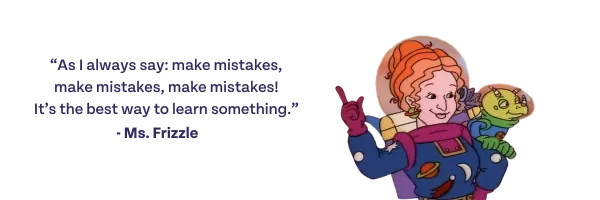
Ms. Frizzle is one of those teachers on TV who actually taught millions of children from the comfort of their homes by discussing real scientific concepts in each episode. There’s a reason she’s a household name. In terms of technical teaching chops, she’s got a long list of accomplishments, but if we’re going to evaluate her in real-world terms…can we forgive the long list of times she endangered student lives?
For the sake of this evaluation, let’s look at her skills alongside her drawbacks.
Student growth: 5/5
In every episode, Ms. Frizz’s students grow. Not only do they learn a key lesson about science, but they usually bring home a personal lesson, too. Helping students grow as people while they learn academically is the best kind of growth a teacher can hope for.
Classroom management: 2/5
Ms. Frizz’s classroom can best be described as “controlled chaos.” While she always seems to have some sense of what’s going on and like she’s got a distant hand in everything, she always encourages growth through distress and chaos, letting students learn somewhat natural consequences for their choices. While this isn’t a bad strategy, it probably doesn’t fit well in a traditional classroom.
Instructional practices: 5/5
One of the strengths of Ms. Frizz’s teaching style is that students teach themselves the most valuable pieces of the lesson. Not only are the students unlikely to forget what they learn, but they have also taught themselves how to ask questions, solve problems, and follow their curiosities. Her classroom is project-based learning incarnate!
Assessment and feedback: 3/5
Ms. Frizz could probably step in to offer guidance more often than she does, but she’s always prepared to offer positive feedback when her students are onto something.
#8. Ms. Labonz, Bob’s Burgers
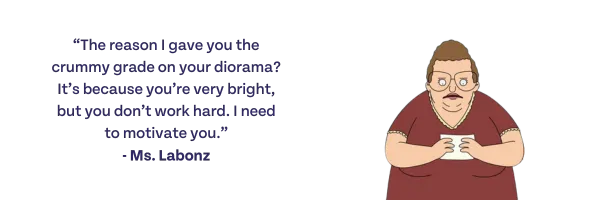
Including Ms. Labonz on this list might be controversial. In the show, she’s sarcastic, lazy, and often unprofessional; however, like many of the best teachers on this list, she encourages growth in her students and cares a lot about them. While she may show her love for teaching in unique ways, she’s a relatable character who still has some strong teaching skills to show for her decades as a teacher.
Ms. Labonz may not fare as well on a standard evaluation, but let’s see what the numbers say.
Student growth: 3/5
We have three concrete examples of student growth under Ms. Labonz in Gene, Tina, and Louise, her only current student. In one episode, it’s revealed that Louise excelled on an assignment, earning an A- when she did poorly on a previous assignment. The reason for this growth? Ms. Labonz knew that Louise was motivated by vengeance, so Louise worked harder to prove her teacher wrong on the next project.
Classroom management: 4/5
All things considered, Ms. Labonz's classroom is very well controlled! We never see examples of students running amok or causing problems during her class. While it’s well managed, we also don’t see a lot of engagement or active teaching techniques on display.
Instructional practices: 3/5
From what we can see, Ms. Labonz is a fairly traditional teacher. She lectures, assigns readings, and has students complete homework or projects. Sometimes, she sits behind her desk when she should be up and interacting with the students, but she’s often involved with them, correcting behaviors and offering her insight at their desks.
Assessment and feedback: 3/5
While hilarious in the show, Ms. Labonz’s tendency to be blunt and slightly insulting to her students probably isn’t best practice. In this world, it’s somewhat well received by students, but apparently, she once told Rudy not to quit his day job as feedback on an assignment. In this same episode, Labonz encourages a great deal of personal growth in Louise! So, something she’s doing is working.
#9. Paul Hunham, The Holdovers
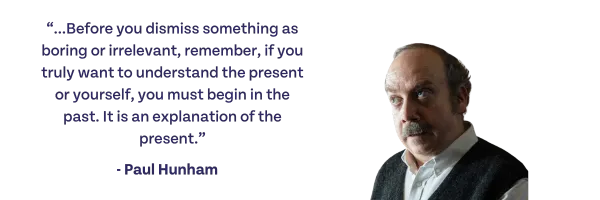
One of the lesser-known on this list, Mr. Hunham is like the flip side of Mr. Keating’s coin in Dead Poet’s Society. He is a man with an intense love of History whose bitter demeanor has made him many enemies; however, after spending the length of a movie with him, the viewer can’t help but admire him for his deep knowledge of the subject and his willingness to risk it all for his student.
Like Mr. Keating, Hunham teaches a wealthy group of private school students; however, his approach is rather more judgmental. His ultimate goal is to shape his students into contributing members of society who appreciate what they have. While his approach could use some work, he’s got a lot going for him. Check out his final scores.
Student growth: 5/5
We only see one example of student growth in The Holdovers, but it’s a strong one. In the movie, Mr. Hunham mentors a single student, Angus Tully. Tully starts off headstrong and uncooperative. By the end, he’s a more selfless, self-aware student who is kinder than before. Mr. Hunham may not have taught him these lessons by conventional means, but the best teachers often make a huge difference for students by simply speaking their language and showing them they care.
Classroom management: 2/5
Mr. Hunham doesn’t have great control of his classroom or his students, as he’s constantly battling with their willful and unpredictable behavior. In fact, at one point, he completely loses a student in another city, partly because he lets them have a bit more sway over him than they probably should.
Instructional practices: 3/5
Clearly an expert in his field, Mr. Hunham is a poetic yet verbose teacher. He relies on punishment, lack of flexibility, and hard work to shape his students. However, through conversations with others, we learn that he is aware of each student’s individual strengths and weaknesses and often makes individualized decisions in an attempt to help them grow–even if that means the students think poorly of him.
Assessment and feedback: 3/5
Feedback is always abundant with Mr. Hunham. He always has a great deal to say, even if it is not entirely appropriate in tone or harshness. While he deals out criticism aplenty, he’s also willing to share positive feedback with those who earn it, making their wins hard earned and worthwhile.
That special something all these teachers share
This group of teachers has a lot in common, from a shared passion for teaching to strong instructional practices. Yet, the one and strongest tie that binds them together is their care for their students. Even the less skilled teachers are memorable, worthy mentors to their students because of their love for them and their dedication to student growth. While we celebrate and emulate these characters, we also hope to celebrate the real-life teachers who embody these characteristics in their everyday lives. We support you wholeheartedly.
Connect with us for more teacher-friendly topics
Subscribe to our newsletter for updates on our publications, or you can follow us on social media! We post about topics that are most helpful to educators; however, we also offer software solutions that improve teacher and student quality of life, including a staff evaluation tool that makes it easy for teachers and evaluators to make growth-driven professional decisions.


.png)


.png)
.webp)